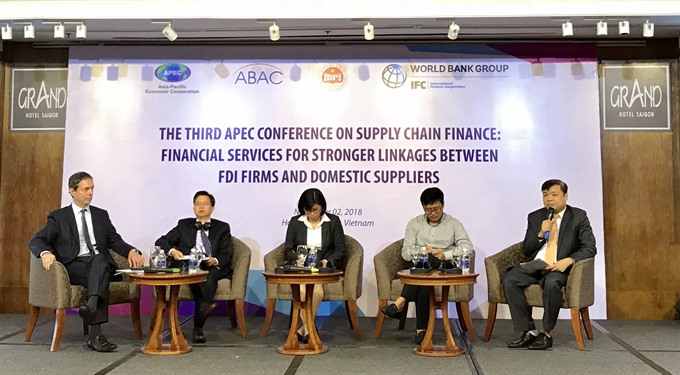 Economy
Economy

FinTech helps small- and medium-sized enterprises (SMEs) in emerging markets like Việt Nam participate in supply chain finance, spurring company growth, speakers said at an APEC conference on supply chain finance held yesterday in HCM City.
 |
| Nguyễn Hoa Cương (right), deputy general director of the Agency for Enterprise Development under the Ministry of Planning and Investment, speaks at the third APEC conference on supply chain finance held yesterday in HCM City. VNS Photo Bồ Xuân Hiệp |
HCM CITY — FinTech helps small- and medium-sized enterprises (SMEs) in emerging markets like Việt Nam participate in supply chain finance, spurring company growth, speakers said at an APEC conference on supply chain finance held yesterday in HCM City.
Marcel Reymond, head of cooperation of the Embassy of Switzerland’s State Secretariat for Economic Affairs, said: “FinTech (financial technology that provides financial services through useful technologies) offers potential to elevate growth, deepen financial services and create trust among business partners.”
“For emerging markets, the importance of FinTech in trade and financial services at the global level is undeniable,” he added.
Reymond noted that low labour costs had successfully attracted FDI in Việt Nam but were no longer the driver of growth.
Sustaining growth at advanced stages of development demands a new model based on improved productivity, according to him.
“We are certain that supply chain finance offers effective solutions for local business entities to successfully link up to global supply chains,” he told Việt Nam News on the sidelines of the conference on supply chain finance.
“Yet it is critically important to engage a range of stakeholders to develop supply chain finance in Việt Nam,” he said. “Only with a joint effort among SMEs, financial institutions and services providers, as well as regulators, will we be successful.”
Nguyễn Hoa Cương, deputy general director of the Agency for Enterprise Development under the Ministry of Planning and Investment, said that SMEs would continue to play a major role in the country’s resilient economy.
“Promoting SME development is critical for inclusive economic growth,” he said, adding that lack of access to finance was a key challenge facing SME growth.
Supply chain finance solutions
Vương Thị Huyền, deputy CEO of Việt Nam International Bank, told Việt Nam News: “Given the diverse nature of SMEs, there is no one-size-fits-all solution for SME finance” and that finance for local SMEs mainly came from local banks at a high interest rate, making the sources more difficult to obtain.
In addition, most financial reports submitted by SMEs did not show the reality of their business operations (the revenue and profits were much lower than reality). And as a result, banks could not give them loans.
Huyền explained that most SMEs still used cash transactions instead of banking services, and to avoid taxes, lowered the figures in their financial reports.
A World Bank Enterprises Survey conducted in 2015 found that about 57 per cent of SMEs did not have access to loans from formal financial institutions. In reality, the ratio could be between 65 and 72 per cent.
SMEs in most emerging markets lack access to credit and liquidity because the credit risk of such businesses is difficult to assess and their working capital needs are unpredictable, according to a World Bank report.
In most countries, SMEs operate primarily in the retail and wholesale trade segments, and banks have generally not done enough to finance their domestic or international trade operations, especially open account transactions.
Supply chain finance structures offer an alternative solution to finance the trade flows of these enterprises, with benefits for all stakeholders, including large enterprises, their SME trading counterparts, and financial institutions, the World Bank report says.
Supply chain finance is a partnership solution between the buyer (mostly multinationals) and a commercial bank, which allows suppliers (mostly SMEs) to join a programme to sell their receivables to the bank which is delivered to and accepted by the buyer.
This financial structure is an ideal solution that leads to twin advantages: it reduces the average day sales outstanding (DSO) of the supplier, and increases the day pay outstanding (DPO) of the buyer.
SMEs account for 97 per cent of all enterprises and employ more than half of the workforce across APEC economies. They account for 20 - 50 per cent of GDP in most APEC economies.
Established in 1989, APEC comprises 21 economies, with Việt Nam joining in 1998. In Việt Nam, SMEs employ more than 50 per cent of the workforce, contributing more than 40 per cent of GDP. — VNS




